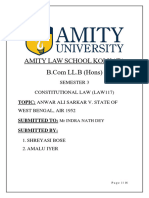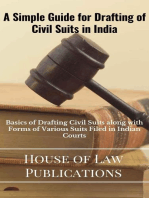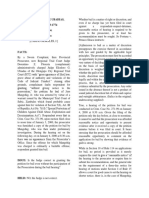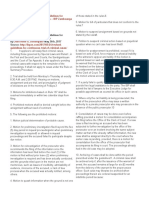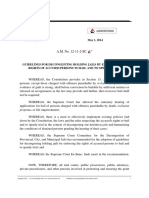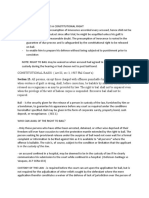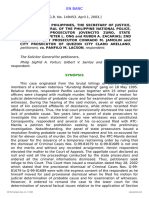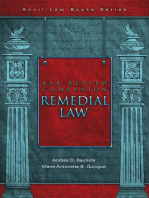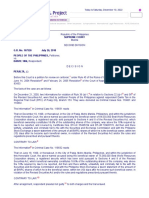0 ratings0% found this document useful (0 votes)
23 viewsPH Courts
1. A case can only be provisionally dismissed with the express consent of the accused and notice to the offended party.
2. For offenses punishable by 6 years or less in prison, a provisional dismissal becomes permanent after 1 year. For offenses over 6 years, it becomes permanent after 2 years.
3. The Constitution requires judgments to clearly state the facts and law a decision is based on. Judges must make complete factual findings and scrutinize legal aspects in light of evidence.
Uploaded by
Julie JonsonCopyright
© © All Rights Reserved
Available Formats
Download as PDF, TXT or read online on Scribd
0 ratings0% found this document useful (0 votes)
23 viewsPH Courts
1. A case can only be provisionally dismissed with the express consent of the accused and notice to the offended party.
2. For offenses punishable by 6 years or less in prison, a provisional dismissal becomes permanent after 1 year. For offenses over 6 years, it becomes permanent after 2 years.
3. The Constitution requires judgments to clearly state the facts and law a decision is based on. Judges must make complete factual findings and scrutinize legal aspects in light of evidence.
Uploaded by
Julie JonsonCopyright
© © All Rights Reserved
Available Formats
Download as PDF, TXT or read online on Scribd
You are on page 1/ 3
1.
Discuss the Rule on Provisional What is the period of effectiveness of provisional
Dismissal P997 dismissal?
The rule on provisional dismissal of offenses shall be
Section 8 Rule 117. Provisional dismissal. - A as follows:
case shall not be provisionally dismissed except (1) Offenses punishable by imprisonment not
with the express consent of the accused and with exceeding six (6) years or a fine of any
notice to the offended party. amount, or both, shall become permanent
one (1) year after issuance of the order
The provisional dismissal of offenses punishable without the case having been revived;
by imprisonment not exceeding six (6) years or a (2) With respect to offenses punishable by
fine of any amount, or both, shall become imprisonment of more than six (6) years,
permanent one (1) year after issuance of the order their provisional dismissal shall become
without the case having been revived. With permanent two (2) years after issuance of
respect to offenses punishable by imprisonment the order without the case having been
of more than six (6) years, their provisional revived.
dismissal shall become permanent two (2) years
after issuance of the order without the case Prescriptive period to revive the case; Mandatory
having been revived.
- In sum, the Court is of the considered view
What is the rule on provisional dismissal? that the subject dismissal of the criminal
A case shall not be provisionally dismissed except cases was provisional in nature and that the
with the express consent of the accused and with cases presently sought to be prosecuted by
notice to the offended party. the respondent are mere revival or
re-opening of the dismissed cases.
When can a case be provisionally dismissed - The present controversy, being one
- A case can only be dismissed provisionally if involving, “provisional dismissal” and revival
the accused expressly consents, such of criminal cases, falling within the purview of
consent given in writing or viva voce. the prescriptive period provided under
- It must be positive, direct, unequivocal Section 8, Rule 117 of the 2000 Revised
consent requiring no inference or Rules of Criminal Procedure.
implication to supply its meaning - The second paragraph of the said provision
- The mere inaction or silence of the is couched in clear, simple and categorical
accused to a provisional dismissal of the words. It mandates that for offenses
case or his failure to object to a punishable by imprisonment of more than six
provisional dismissal doesn’t amount to (6) years, as the subject criminal cases, their
express consent. provisional dismissal shall become
permanent two (2) years after the issuance
What are the requisites laid down by People v. of the order without the case having been
Lacson revived.
1. The prosecution, with the express - It should be noted that the revival of the
conformity of the accused or the latter’s subject criminal cases, even if recokened
counsel moves for a provisional dismissal of from the DOJ’s issuance of subpoena to
the case; or both the prosecution or petitioner, was commenced only on April 19,
accused move for a provisional dismissal 2001, that is, more than two (2) years after
of the case the issuance, on March 29, 1999, pf
2. The offended party is notified of the RTC-Quezon City’s Resolution, provisionally
motion for a provisional dismissal of the dismissing the criminal cases now sought to
case be revived. Applying the clear and
3. The court issues an order granting the categorical mandate of Section 8, Rule 117,
motion and dismissing the case provisionally supra, such efforts to revive the criminal
4. The public prosecutor is served with a cases are not definitely barred by the
copy of the order of provisional dismissal two-year prescriptive period provided
of the case therein.
(People of the Philippines, et al. v. Panfilo What is the constitutional requirement of a
Lacson, G.R. No. 149453, May 28, 2002) judgment?
A decision must clearly state the facts and the law on
2. Is trial necessary to secure a judgement? which it is based.
What are the exceptions? P.1102
Constitutional requirements of judgment
Trial Distinguished From Hearing - The constitution commands that “no decision
Hearing is more broader in its scope as it includes a shall be rendered by any court without
pre-trial conference, hearing on the motion, and trial; expressing therein clearly and distinctly the
while trial is limited only to the presentation of facts and the law on which it is based.”
evidence and witnesses before the court. (Article VIII, Section 14, 1987 Constitution)
- Judges are expected to make complete
Is Trial Necessary To Secure A Judgment? findings of fact in their decisions and
Trial is necessary if there are legal and factual issues scrutinize closely the legal aspects of the
involved in the case which requires presentation of case in the light of the evidence presented.
evidence and witnesses. - They should avoid the tendency to
generalize and form conclusions without
What are the Exceptions? detailing the facts from which such
Trial is no longer necessary in order for the conclusions are deduced. (Lenido Lumanog
adjudication of the criminal action in the following and Augusto Santos v. People, G.R. No.
instances: 182555, September 7, 2010)
1) When the accused pleads guilty to the
offense during arraignment under Rule 116; Right to be informed of the nature and cause of the
2) Plea bargaining during arraignment or accusation against him
pre-trial conference; (1) Specific allegations of crime charged - This
3) When the motion to quash on the ground of right implies that the offense which a person
double jeopardy or prescription of action or is accused of be made known to him.
liability is granted under Rule 117; - The criminal complaint or
4) When there is a provisional dismissal under information should be sufficiently
Rule 117; clear to a person of ordinary
5) When there is failure of the prosecution to intelligence as to what the charge is
bring the accused to trial within the time so as to enable him to prepare his
prescribed under the rules; and defense.
6) When the case was dismissed due to the - It is imperative that he is thus made
grant of the motion for judicial determination fully aware of possible loss of
of probable cause. freedom, even of his life, depending
on the nature of the crime imputed
3. Explain the so-called constitutional to him. (Borja v. Mendoza, supra;
requirement of a judgment? P.1291 Matilde, Jr. v. Jabson, Dec. 29,
1975)
Article III, Section 14 of the Constitution (2) Remedy of accused right whose right is
violated - This requirement of notice is
“No court shall render a decision without stating indispensable inasmuch as in criminal cases
clearly and distinctly the facts and the law on not only the liberty but even the life of the
which it is based. accused may be at stake.
- Thus, there is a violation of the right
No petition for review or motion for where an accused has been
reconsideration of a decision of the court shall be charged with an offense and
refused due course or denied without stating the convicted of another, or where no
legal basis therefor. arraignment of the accused has
taken place. (People v.
AbadSantos, 78 Phil. 774; U.S. v.
Sobrevinas, 35 Phil. 32)
- The proceedings in such case may
be challenged and annulled in the
proper court, at the instance of the
accused. But an accused may be
convicted of a lesser offense (e.g.,
theft) included in that (e.g., robbery)
which is charged.
Trial in the absence of the accused
(1) Conditions - The constitutional right of the
accused to be personally present and to be
heard in his defense by himself may be
waived by him. Thus, trial may proceed
notwithstanding the absence of the accused
provided that three (3) conditions concur:
(a) He has arraigned;
(b) He has been duly notified of the
trial; and
(c) His failure to appear is unjustifiable.
(Sec. 14[2])
(2) Reason for rule - The rule is in the interest of
a speedy administration of justice which
should be afforded not only to the accused
but to the offended party as well. An accused
cannot, by simply escaping, that his
prosecution and possibly, eventual
conviction provided only that the three (3)
conditions mentioned are present. (People v.
Salas, 143 SCRA 163, July 29, 1986)
You might also like
- Download Criminal Courts A Contemporary Perspective Craig T. Hemmens ebook All Chapters PDF100% (1)Download Criminal Courts A Contemporary Perspective Craig T. Hemmens ebook All Chapters PDF45 pages
- The Book of Writs - With Sample Writs of Quo Warranto, Habeas Corpus, Mandamus, Certiorari, and ProhibitionFrom EverandThe Book of Writs - With Sample Writs of Quo Warranto, Habeas Corpus, Mandamus, Certiorari, and Prohibition5/5 (11)
- Cengage Advantage Books Law For Business 19th Edition by Ashcroft Ashcroft Patterson ISBN Solution Manual100% (44)Cengage Advantage Books Law For Business 19th Edition by Ashcroft Ashcroft Patterson ISBN Solution Manual4 pages
- Anwar Ali Sarkar v. State of West BengalNo ratings yetAnwar Ali Sarkar v. State of West Bengal16 pages
- Pre-Bar Notes On Criminal PROCEDURE (2019) : JurisdictionNo ratings yetPre-Bar Notes On Criminal PROCEDURE (2019) : Jurisdiction183 pages
- Judge Ethan P. Schulman, San Francisco Superior Court100% (1)Judge Ethan P. Schulman, San Francisco Superior Court22 pages
- People, Sec of Justice vs. Panfilo LacsonNo ratings yetPeople, Sec of Justice vs. Panfilo Lacson5 pages
- Pauper Litigant. Any Court May Authorize ANo ratings yetPauper Litigant. Any Court May Authorize A22 pages
- People vs. Lacson: VOL. 400, APRIL 1, 2003 267No ratings yetPeople vs. Lacson: VOL. 400, APRIL 1, 2003 26790 pages
- Supreme Court: The Solicitor General For Plaintiff-Appellee. Rosendo C. Ramos For Accused-AppellantNo ratings yetSupreme Court: The Solicitor General For Plaintiff-Appellee. Rosendo C. Ramos For Accused-Appellant6 pages
- Supreme Court of The Phillipines: Guidelines For Decongestingholding Jails by Enforcing The Rights Ofaccused Persons To Bail and To Speedy TrialNo ratings yetSupreme Court of The Phillipines: Guidelines For Decongestingholding Jails by Enforcing The Rights Ofaccused Persons To Bail and To Speedy Trial8 pages
- G.R. No. L-14819 March 19, 1959 Alfredo B. Saulo, Petitioner, vs. Brig. Gen. Pelagio CRUZ, ETC., RespondentNo ratings yetG.R. No. L-14819 March 19, 1959 Alfredo B. Saulo, Petitioner, vs. Brig. Gen. Pelagio CRUZ, ETC., Respondent7 pages
- Salient Features of The Revised Guidelines For Continuous Trial of Criminal Cases by May 24th, 2017 SourceNo ratings yetSalient Features of The Revised Guidelines For Continuous Trial of Criminal Cases by May 24th, 2017 Source6 pages
- A.M. No. 12-11-2-SC Guidelines For Decongesting Holding JailsNo ratings yetA.M. No. 12-11-2-SC Guidelines For Decongesting Holding Jails6 pages
- Salient Features of The Revised Guidelines For Continuous Trial of Criminal CasesNo ratings yetSalient Features of The Revised Guidelines For Continuous Trial of Criminal Cases6 pages
- SC A.M. No. 12-11-2 SC Decongesting Holding Jails PDFNo ratings yetSC A.M. No. 12-11-2 SC Decongesting Holding Jails PDF11 pages
- RA 10707 (Probation Law) : Probation - Is A Disposition Under Which A Defendant, After RecognizanceNo ratings yetRA 10707 (Probation Law) : Probation - Is A Disposition Under Which A Defendant, After Recognizance3 pages
- Salient Features of The Revised Guidelines For Continuous Trial of Criminal CasesNo ratings yetSalient Features of The Revised Guidelines For Continuous Trial of Criminal Cases4 pages
- Indeterminate Sentence Law (Act No. 4103)No ratings yetIndeterminate Sentence Law (Act No. 4103)2 pages
- A.M. No. 12-11-2-SC Court Decongestion Right To Speedy TrialNo ratings yetA.M. No. 12-11-2-SC Court Decongestion Right To Speedy Trial5 pages
- William Co Aka Xu Quing He Vs New Prosperity Plastic ProductsNo ratings yetWilliam Co Aka Xu Quing He Vs New Prosperity Plastic Products4 pages
- Rules of Criminal Procedure: RULE 116 Arraignment and PleaNo ratings yetRules of Criminal Procedure: RULE 116 Arraignment and Plea11 pages
- Section 13. All Persons, Except Those Charged With Offenses Punishable by Reclusion PerpetuaNo ratings yetSection 13. All Persons, Except Those Charged With Offenses Punishable by Reclusion Perpetua14 pages
- 9-23-2020-Motion To Post Bail - Voltaire Gebulaguin - Atty. Blancia - Docx (Edited)No ratings yet9-23-2020-Motion To Post Bail - Voltaire Gebulaguin - Atty. Blancia - Docx (Edited)7 pages
- California Supreme Court Petition: S173448 – Denied Without OpinionFrom EverandCalifornia Supreme Court Petition: S173448 – Denied Without Opinion4/5 (1)
- Water Code of The Philippines Amended Implementing Rules and RegulationsNo ratings yetWater Code of The Philippines Amended Implementing Rules and Regulations40 pages
- Ang Nars Party List V Executive SecretaryNo ratings yetAng Nars Party List V Executive Secretary70 pages
- AZAMETSI AND OTHERS v. THE REPUBLIC (1974) 1 GLR 228-246No ratings yetAZAMETSI AND OTHERS v. THE REPUBLIC (1974) 1 GLR 228-24620 pages
- Hygienic Packaging Corp. v. Nutri-Asia, Inc PDFNo ratings yetHygienic Packaging Corp. v. Nutri-Asia, Inc PDF26 pages
- Supreme Court: Francisco Sevilla For Appellant. Attorney-General Avanceña For AppelleeNo ratings yetSupreme Court: Francisco Sevilla For Appellant. Attorney-General Avanceña For Appellee12 pages
- Instant Access to Legal Studies for VCE, Justice & Outcomes: Units 3 & 4 15th Edition Lisa Filippin ebook Full Chapters100% (9)Instant Access to Legal Studies for VCE, Justice & Outcomes: Units 3 & 4 15th Edition Lisa Filippin ebook Full Chapters40 pages
- Uganda Breweries Limited V Uganda Railways Corporation 2002 UGSC 40 (24 April 2002)No ratings yetUganda Breweries Limited V Uganda Railways Corporation 2002 UGSC 40 (24 April 2002)38 pages
- G.R. No. 222678 Joanne Kristine Pimentel Vs AdiaoNo ratings yetG.R. No. 222678 Joanne Kristine Pimentel Vs Adiao1 page
- Hon. Justice Joseph Oguttu Mboya - Navigating The Legal Landscape. A Comprehensive Guide To Civil Litigation Practice in KenyaNo ratings yetHon. Justice Joseph Oguttu Mboya - Navigating The Legal Landscape. A Comprehensive Guide To Civil Litigation Practice in Kenya15 pages
- Fadhil Mollel Vs Lekule Loshura (Civil Appeal 22 of 2019) 2021 TZHC 2932 (23 April 2021)No ratings yetFadhil Mollel Vs Lekule Loshura (Civil Appeal 22 of 2019) 2021 TZHC 2932 (23 April 2021)10 pages
- Fundamentals of Criminal Investigation and Intelligence100% (2)Fundamentals of Criminal Investigation and Intelligence23 pages
- LB 501 Moot Court Mock Trial and Internship - 2023100% (1)LB 501 Moot Court Mock Trial and Internship - 2023242 pages
- Sakarben Shambhubhai Rabari v. Shambhubhai Masharubhai Rabari KalotaraNo ratings yetSakarben Shambhubhai Rabari v. Shambhubhai Masharubhai Rabari Kalotara8 pages
- Adzuara vs. CA, G.R. No. 125134, January 22, 1999No ratings yetAdzuara vs. CA, G.R. No. 125134, January 22, 19995 pages
- Crime (Criminal) : Crime and Delinquency. Protect Life and Property and To Maintain Peace and OrderNo ratings yetCrime (Criminal) : Crime and Delinquency. Protect Life and Property and To Maintain Peace and Order38 pages



